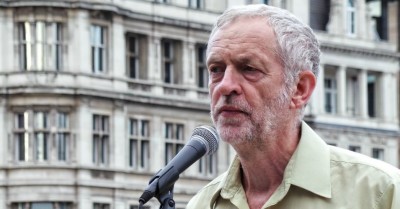Jeremy Corbyn Elected Britain’s New Labour Party Leader

Longtime British Labour party MP since 1983, Corbyn was considered a 100 – 1 shot for its leadership after declaring his candidacy in June, on an anti-war, anti-austerity platform, saying:
“This decision to stand is in response to an overwhelming call by Labour party members who want to see a broader range of candidates and a thorough debate about the future of the party. I am standing to give Labour party members a voice in this debate.”
He promised a “different economic strategy, particularly opposing austerity” – calling other Labour leadership candidates cardboard cutouts of each other – failing to offer “a clear enough alternative on the economic strategy and austerity, and our attitude to welfare expenditure.”
London’s Guardian called him one of Labour’s “most rebellious” MPs, defying its former leadership 238 times. According to the Financial Times, it was over 500 times.
As new Labour leader will he make a difference, or is he Britain’s Bernie Sanders and Greece’s Alexis Tsipras – a real or phony populist? Will he run ahead for prime minister on a progressive, anti-war platform?
Will he stand forthrightly and unequivocally against business as usual – or simply support cosmetic changes too insignificant to matter?
He’s a member of the Socialist Campaign Group, the Palestinian Solidarity Campaign, Amnesty International, the Campaign for Nuclear Disarmament, and chairs Britain’s Stop the War Coalition.
He calls himself a democratic socialist, advocating renationalizing Britain’s utilities and railways, making business pay its fair share in taxes, ending austerity, reversing public welfare cuts, abolishing higher education tuition fees, nuclear disarmament, and quantitative easing for ordinary people, vital infrastructure and renewable energy projects.
He said “(w)e need to strongly challenge NATO supremacy and oppose its exercise in Ukraine.” He opposes Britain’s membership in the US-dominated Alliance.
His web site jeremyforlabour.com says “(o)ur timeless task in the Labour Party is to stand up against injustice wherever we find it. That notion has driven me throughout my political life – and it’s what drove me to stand for Parliament in the first place.”
In mid-August, he said “(s)urely it is high time that we had a serious debate about Britain’s overall defense and foreign policy. More than 60 years of Nato membership has brought us enormous levels of military expenditure and by our close relationship with the US through NATO and the Mutual Defence Agreement involved us in countless conflicts.”
“In a world beset by conflict, often around the grab for natural resources and fueled by the greed of arms and defence manufacturers, surely it’s time to reassess our priorities for a foreign policy based on human values, peaceful development and not exacerbating military aggression.”
In late August, Britain’s Stop the War coalition discussed “10 reasons” UK neocons oppose Corbyn for Labour party leadership.
1. He opposed US/UK et al war on Yugoslavia, Afghanistan, Iraq, Libya and Syria. He wants individuals responsible for illegal wars held accountable.
2. He’s a “dangerous leftist” – supporting policies benefitting ordinary Brits for the first time since pre-Margaret Thatcher’s anti-populism.
3. He’s critical of US and Israeli policies – supports long denied justice for Palestinians.
4. He has undefined “extremist links.”
5. His policies make him “unelectable.”
6. He wants 1970s policies reinstituted – when the gap between Britain’s rich and poor was the lowest in UK history.
7. His anti-militarism agenda “would leave Britain defenseless and open to invasion.”
8. Earlier, he praised one of John Pilger’s articles – condemning the devastating human cost of US-led NATO’s rape of Yugoslavia.
9. He “opposes austerity.”
10. He enjoys increasing popularity. He says things people want to hear as well as voting on the right side of important issues.
It’s one thing supporting populist interests as a powerless backbencher, quite another as party leader. He’ll face enormous pressure to bend, perhaps too much to withstand, maybe enough to make a possible transformational leader into a largely business as usual compliant one.
As Labour leader, it’s up to him to stand forthright for principles he rhetorically supports and against Britain’s devastating domestic and foreign policy agenda – using his bully pulpit to rally Brits against an overwhelming right-wing parliament.
He won a smashing victory with around 60% support – compared to 19% for his nearest rival (Andy Burnham), 17% for Yvette Cooper, and 4% for Blairite Liz Kendall.
Newly elected deputy leader Tom Watson called for party unity, saying he “promised to back the new leader 100% and I plan to do exactly that.”
The Financial Times said he “filled (Labour) with division and dismay.” He’s “an unlikely figure to try impose discipline upon the ranks…”
The New York Times said he ‘promis(es) radical approaches to longstanding problems.” The Washington Post called him “a left-wing rebel…a grassroots phenomenon.”
The Wall Street Journal said his leadership “could herald a realignment of British politics. (His) anti-austerity, anti-war and egalitarian message has resonated with supporters…”
He faces a daunting task against majority right-wing pro-business, pro-war, anti-populist Labourites masquerading as democrats – besides sure to come enormous bipartisan business as usual pressure from Washington.
Stephen Lendman lives in Chicago. He can be reached at [email protected].
His new book as editor and contributor is titled “Flashpoint in Ukraine: US Drive for Hegemony Risks WW III.”
http://www.claritypress.com/LendmanIII.html
Visit his blog site at sjlendman.blogspot.com.
Listen to cutting-edge discussions with distinguished guests on the Progressive Radio News Hour on the Progressive Radio Network.
It airs three times weekly: live on Sundays at 1PM Central time plus two prerecorded archived programs.

